
Sue’s Gift Blog
Being Good Enough
I’ve found it interesting that several patients over the years have shared with me that they worked hard to be” a good patient.” When asked what they meant by that, their responses ranged from, “I’m going to do everything the doctor says,” to “I won’t let them know I’m really frustrated by the long wait times to be seen or that the doctor is always in such a hurry.” Each of them felt they weren’t being “a good patient” if they appeared frustrated or irritated, questioned the medical staff, or asked for a more convenient appointment time, because they didn’t want to be labeled by the staff as “difficult.” It was very important to each of them to be seen as a good patient, maybe even “the perfect patient.”
Mantras
The word mantra comes from Sanskrit meaning “sacred message.” It’s a short, positive statement or affirmation to say to yourself each day to remind yourself of your strength and resilience. Mantras are personal. Your mantra may not be meaningful to me, and my mantra may be useless to you, so finding a mantra or mantras that resonate with you is the key to their effectiveness and power. Plus, it’s important to have a variety of mantras for different situations, like coping with anxiety, depression, fear, or self-esteem issues.
Make A Plan
Why is self-care so hard and what keeps one from implementing self-care measures? I believe there are several reasons. Many of us were taught early on that it’s better to give than receive. So, we’ve spent years giving – sometimes to the point of exhaustion and depletion.
What Did You Learn?
She told me the story of her grandson’s death. He was five and the favorite of her four grandchildren. It was a tragic accident – too horrifying to recount the details here. She shared those details in my Beginning Again grief group a year after his death. Even though it was many years ago, I’ll never forget her story. And I will never forget her response to his death.
Recalculating
I remember being excited about getting our first car GPS system. I was both amused and frustrated when, upon taking a different route than the one outlined in the system, the voice would say, “Recalculating! Recalculating!” Amused… that it responded that way; frustrated… when it kept repeating the phrase over and over.
Back To Basics
The Cambridge Dictionary defines “back to basics” as returning to the simple and most important things. Another definition suggests it’s paying attention to the simplest and most important matters after ignoring them for a while.
Samia Hasan is a career development coach for millennials and has outlined tips related to simplifying life and getting back to basics. I think they’re relevant to all of us, especially after being confronted with a life-threatening diagnosis or other traumatic life event. Here are her suggestions and my thoughts about each.
Learning To Live Without Fear
Looking back, I suspect I lived a good portion of my life in chronic fear… fear of not being good enough, fear of failure, fear of disappointing someone, fear of others’ opinions, fear of financial dependency or ruin, fear of being homeless, fear of deep water, and those are the fears that immediately come to mind.
Taking Care
We’re so good at taking care of the family…the children, an ill spouse, elderly parents, the house, the yard, pets, the job, co-workers or friends. Most of the time it feels good to be taking care of things and others, but it can be draining and often exhausting. Yet we continue to take care out of love, and if we’re honest, sometimes, out of obligation or duty because there’s no one else.
The Manhole
He was walking down the street, oblivious to his surroundings, absorbed in the video on his iPhone. There was no awareness of the uncovered manhole ahead, until he found himself tumbling into semi-darkness, 10-feet underground. Stunned, but coming to his senses, he yelled for someone to come to his aid, to help him out of the deep hole. He heard a voice above him – the voice of a priest. Thank God, he thought. The priest offered a prayer on his behalf, and walked on.
About The Author
Sherry Martin is the Patient Services Director for Sue's Gift, a licensed clinical social worker with over thirty-five years of experience in the field of oncology social work, and author of the book, Beginning Again: Tools for the Journey through Grief: A Step-by-Step Guide for Facilitators of a Grief Support Group. Sherry lives with her husband in Colorado Springs, Colorado.










